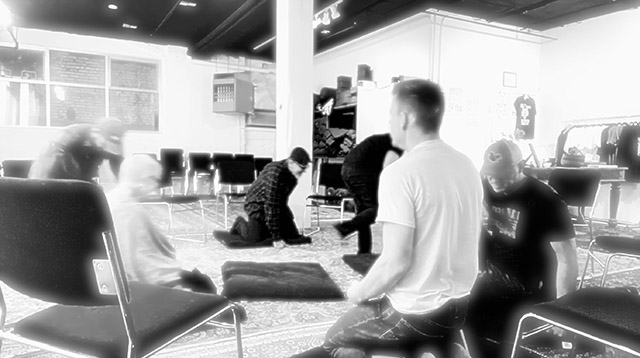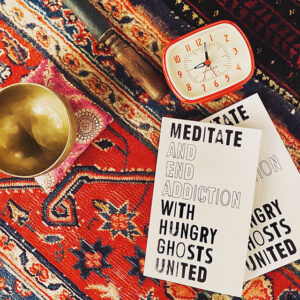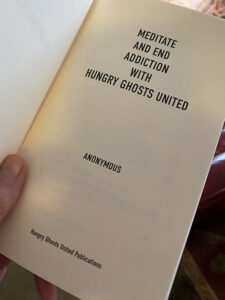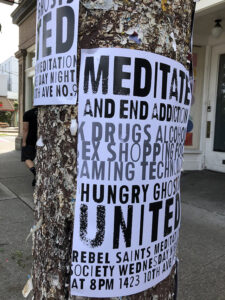New Book, and Hungry Ghosts United Recovery,
Offer Meditation Methods for Addiction Freedom
Written by: anonymous

Hungry Ghosts members meditating together in an anonymous meeting.
Photos by: Hungry Ghosts United World Services
(Editor’s note: This article excludes the full names and photos of recovering people to protect the integrity of the Hungry Ghosts United Recovery Society. More information can be found through the Hungry Ghosts United website.)
Founders of the Seattle-based Hungry Ghosts United collective just published “Meditate and End Addiction with Hungry Ghosts United,” an innovative meditation-based approach to ending many forms of addiction.
The meditation handbook contains 10 essential meditations people can utilize to end addiction to substances including drugs or alcohol, as well as any behavior like shopping, eating, sex, relationships, gaming, gambling and technology.
The term “hungry ghosts” refers to one of the six realms of Buddhist cosmology. In this realm hungry ghosts are discarnate beings lost in attachment and resentment, beings who are constantly plagued by hunger and thirst they can never satisfy.
The founders of Hungry Ghosts United, Rachael S and Joseph S, have trained in the meditation practices found in the earliest teachings of the Buddha, and are recovered addicts themselves. They developed the meditations in the book specifically to find freedom from their own addictive craving, and have been teaching this meditation practice to others in the Hungry Ghosts United recovery groups.
The authors are some of the most experienced members of the Buddhist recovery community in the region. In 2014 they started three of the first Buddhist-inspired recovery groups in Washington state.
This first book from the people of Hungry Ghosts United is an introductory book. It is designed to teach meditation practices useful in recovery for anyone suffering from addiction. The Hungry Ghosts United authors are now compiling a subsequent full-length book, offering complete daily recovery practices, to publish in the winter of 2023.

Published anonymously in the recovery tradition.
A deep issue of addiction
We have a serious addiction problem in the Pacific Northwest and around the world. This leads many people to seek effective ways to attain freedom from addiction.
Since 2009 Pacific Northwest people have been leaders in developing mindfulness meditation-based approaches to addiction recovery. This work includes early groundbreaking studies by Dr. Alan Marlatt at the University of Washington, and the mindfulness-based relapse prevention addiction therapy models that emerged from his work.
From this foundational work arose organizations like the Buddhist Recovery Network, and Northwest Buddhist Recovery, supporting then-fledgling Buddhist-inspired recovery support groups.
A significant step was the 2014 the publication of “Refuge Recovery.” This book launched Refuge Recovery peer-led meetings around the world.
We believe we’re now creating a useful new approach, based on mindfulness meditation coupled with mutual aid techniques adapted from the Twelve Traditions of Alcoholics Anonymous.

Books in action at a meeting of the recovery society.
The power of 12 traditions
Why are mutual-aid recovery groups the most effective approach?
Addiction recovery is often a process of contemplation and gradual change over years. Mutual aid meetings are available throughout an alcoholic’s or addict’s lifetime. When the person is ready to recover there is a group waiting, with tens of thousands of meetings every day, every month of the year, in nearly every city and town.
Most mutual aid groups have been running for decades, using principles expressed in the Twelve Traditions of Alcoholics Anonymous.
Well-functioning 12- traditions recovery groups are kept free from politics, religion and therapy. These principles are designed to create stable, diverse and focused recovery groups.
When mutual aid recovery groups are run according to the twelve traditions, and kept free from politics, religion and therapy, the meetings are diverse, stable and focused. Such meetings in turn attract a variety of people seeking recovery. People find help, and can then engage in service to the recovery group, developing a system of continuous renewal and growth.

Getting the word out in Seattle.
Hungry Ghosts United Responds to a Need
Perhaps surprisingly, in an era of technology, the best recovery results seem to come from “good old-fashioned mutual aid” groups like Alcoholics Anonymous, Narcotics Anonymous and Overeaters Anonymous. This effectiveness was borne out by a definitive 2020 study from Stanford and Harvard universities.
Meanwhile, as meditators in the Buddhist traditions we have experienced the benefits of mindfulness practice in releasing or lessening attachment. Many have looked to Buddhist practice, and our strong meditation tradition, as a way to find freedom from addiction.
Hungry Ghosts United brings these two approaches together. Since 2021 as founders of Hungry Ghosts United we have been creating meditation-based recovery groups linked to the diversity, focus, and stability of twelve step groups.
To do this we looked to our decades of experience building groups in Alcoholics Anonymous and Narcotics Anonymous. We also turned to the effective mindfulness and recovery practices we experienced in our own recovery, which we had spent years teaching to others.
In our new meditation handbook, “Meditate and End Addiction with Hungry Ghosts United,” and in the Hungry Ghosts United recovery groups, we are taking what we have learned through the process. In effect we are offering a new model of a “meditation-based mutual aid recovery society.”
We feel it is our duty to create the first meditation-based recovery program that welcomes everyone from all walks of life, regardless of their religious or political beliefs. Our commitment is that politics, religion and therapy will not be part of the program.
Not only do we not segregate based on identity or beliefs, we do not segregate based on what substance or behavior one is addicted to. We believe addiction is addiction, regardless of the focus of that addiction. We have had great success helping addicts attain and maintain abstinence from illegal and prescription drugs , and also from alcohol, sex, food, gaming and technology.
Our groups hold meetings in person and online where we meditate together, talk about how we use daily meditation practice to end addiction, and help connect new people with mentors who can teach them our practice. When the newly recovered achieve days, weeks and months free from acting on their addiction, they are ready to offer the Hungry Ghosts United daily practice of recovery to anyone who walks in the door.
“Meditate and End Addiction with Hungry Ghosts United” is available in paperback and Kindle ebook version on amazon.com, and through the Kindle Unlimited service.
This book is written by the anonymous founders of the Hungry Ghosts United Recovery Society, who have trained as lay teachers in a Thai forest-influenced lineage, and in Tibetan tradition. In addition the authors have been trained by master-level practitioners in mutual-aid recovery group traditions. This book reflects the effective practices, and the experience, of the earliest Hungry Ghosts United groups.
